Zijn twee internationale succesromans als Oorlog en terpentijn and De bekeerlinge brengen Stefan Hertmans de hele wereld over. Maar de sociale kant van het leven het botst met zijn verlangen naar eenzaamheid. Zes levensvragen aan de Vlaamse auteur Stefan Hertmans. ‘Als ik alleen ben, vind ik mijzelf terug.’
1. Wat is uw terugkerende droom?
‘Vijftig jaar lang heb ik om de week dezelfde nachtmerrie gehad. Ik kijk van bovenaf op een plein waar het krioelt van de mieren. In het midden staat een paal, en één mier loopt steeds naar die paal en terug. Ik word daar gek van.
Elke keer werd ik zwetend wakker – de rillingen lopen me nu nog over de rug. De droom gaat denk ik over onzekerheid. Ik heb altijd moeite gehad met bekend zijn, ik wilde niet die ene mier zijn, maar gewoon tussen de andere mieren blijven. Ik herinner me nog dat ik zeventien was en op het atheneum in Gent zat. Ik zat in de redactie van het schoolkrantje en had een gedicht geschreven over de dood van Stijn Streuvels. Mijn leraar Engels was getrouwd met de dochter van Streuvels. Toen ik de klas binnenkwam, zei hij een beetje ironisch: “Jongens, er is een dichter onder ons.” Ik stíérf van ellende. Daar was ik die mier bij die paal. Dat was de eerste keer dat ik mij eenzaam voelde door het schrijven. Ik voelde me uitgesloten.
Ik heb ermee leren omgaan dat ik iemand ben naar wie gekeken wordt. De beklemming is opgehouden; ik sta rustiger in mijn leven. Misschien is dat de reden dat ik de droom al lang niet meer heb gehad.’
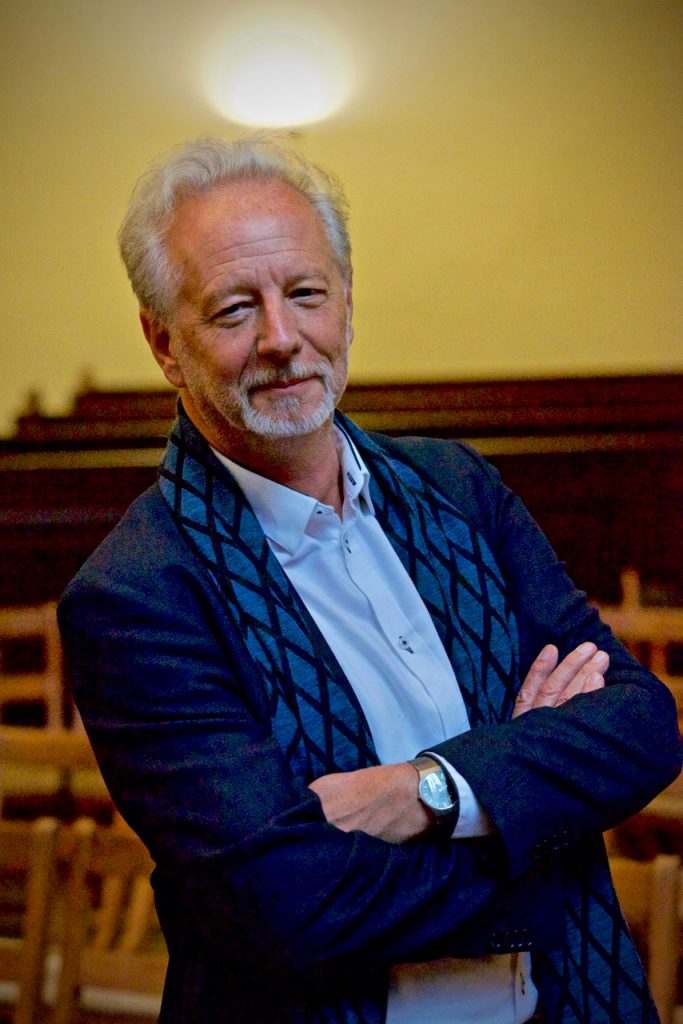
2. Wat is het grootste gemis in uw leven?
‘Ik schrijf al sinds mijn veertiende, maar eigenlijk had ik muzikant willen worden. Ik speelde gitaar en dat kon ik goed; ik had waarschijnlijk mijn hele leven in popbandjes kunnen spelen, en dan was ik een oude rocker geworden. [lacht] Maar ik wilde jazz en klassiek spelen. Daar heb ik mijn tanden op gebroken: ik kon de partituren niet goed genoeg lezen. Toen ik zag hoeveel talent mijn broer had, ben ik opgehouden. Hij had wérkelijk talent: hij is een van de grootste jazzmuzikanten van ons land geworden.
De pijn heb ik verzacht door te gaan schrijven. Mijn schrijven werd voor een groot deel compensatie voor het gemis van muziek – ik had ik een vleugel in mijn huis willen hebben en Bach willen kunnen spelen. Als mijn broer musiceert, heb ik nog altijd heel sterke emoties. Hij kan álles spelen, hij ademt muziek. Daar ben ik jaloers op. Ik mag niet klagen over wat ik gedaan heb in mijn leven. Maar als ik had kunnen kiezen, was het muziek geworden. Dat is voor mij het hoogste.’
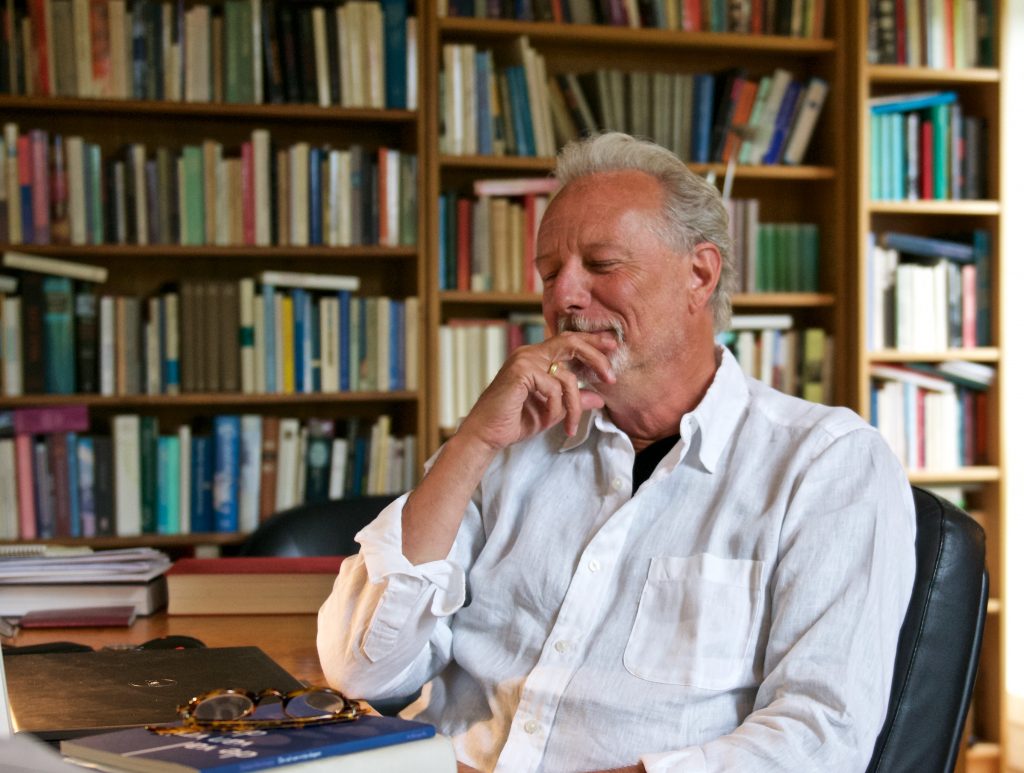
3. Wanneer was u voor het laatst heel kwaad?
‘Gisteren nog. Mijn vrouw Sigrid wilde iets op een bepaalde manier, onze zoon wilde het anders en ik wilde het nog weer anders en dan zitten we met zijn drieën in de oedipale driehoek. We hebben dan ieder voor zich het gevoel dat de ander ons niet begrijpt. Sigrid kan heel kwaad worden, maar zet het snel van zich af. Ik blijf langer sudderen in mijn kwaadheid. Soms roep ik: “Ik ga nu alleen wonen!” Ik moet weg, alleen zijn, pas dan kom ik weer in evenwicht. Zolang ik blijf, blijf ik kwaad.
Je moet kwaad worden om de juiste dingen in het leven, vind ik. Dus niet om banaliteiten, of omdat je ongeduldig of moe bent, of ergens niet mee in het reine bent. Daarin moet je je leren beheersen, al is dat niet simpel. Woede om morele kwesties, politiek, onrecht in de wereld vind ik een goede woede, maar woede in de liefde is destructief. Als ik kwaad ben, lijd ik daaronder. Ik word er ziek van. Ik functioneer niet in disharmonie.
Misschien komt dat doordat ik ben opgegroeid met een grote illusie van harmonie. Ik zeg “illusie”, omdat het vast niet zo harmonieus was als ik dacht. Maar ik streef altijd naar een verloren paradijs. Ik kan niet tegen onrecht en heb een groot talent voor verontwaardiging, zelfs bij iets triviaals als een verkeerssituatie. Op rustige momenten kan ik om mezelf lachen, maar op momenten dat ik het te pakken heb, kan ik niet relativeren. De wereldverbeteraar in mij wordt echt pathetisch kwaad.’
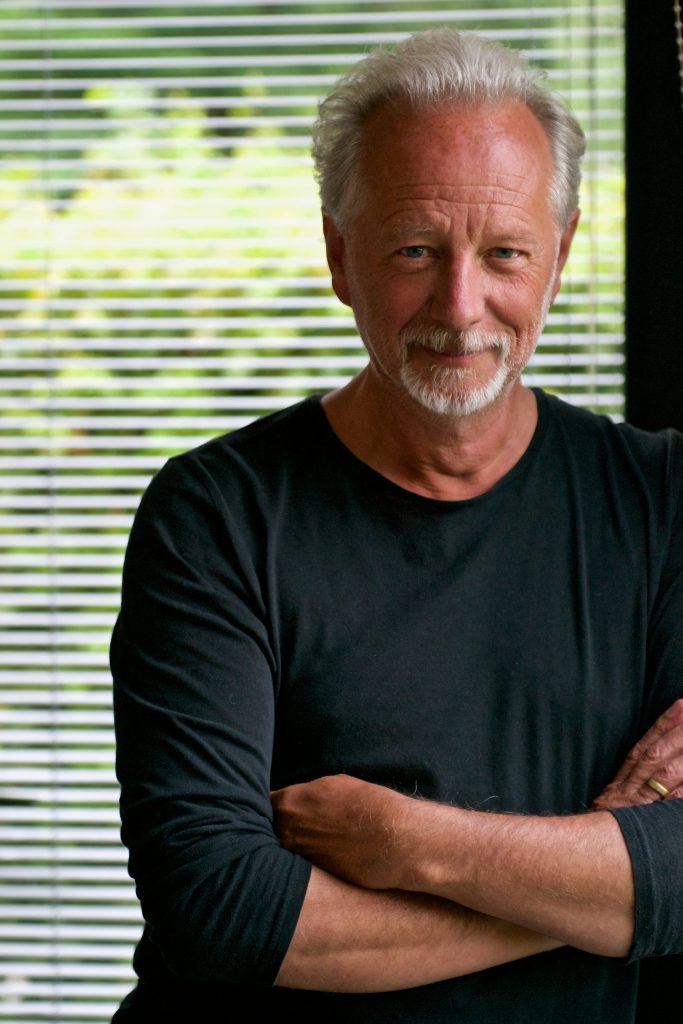
4. Wat is het geheim van goede seks?
‘Emotie. Ideale seks is verliefde seks, waarbij je alle twee het gevoel hebt dat het móét en dat het exclusief is: alleen wij kunnen dit met elkaar op die manier.
Ik heb steeds meer het gevoel dat seksualiteit de enige echte transcendentie van de mens is. Samen kun je het volmaakte aanraken, stijg je boven jezelf uit. Ik geloof ook steeds meer in Marvin Gaye’s Sexual Healing: dat seksualiteit de belangrijkste helende kracht is in het leven. Ik kan me voorstellen dat je goede seks kunt hebben met een willekeurig iemand. Daar heb ik niets op tegen – ik ben geen moraalridder. Maar als je me vraagt wat ik het meest volmaakt vind, wat mij het meest geluk heeft verschaft, dan waren dat de momenten waarop alles samenviel met mijn geliefde en we dezelfde emotie en energie beleefden.
Zulke intensiteit is niet hetzelfde als uitbundige vurigheid; ze kan ook stil en waakzaam zijn. Het draait om aandacht, om schoonheid, om wat jou raakt in die ander, verwondering. Mijn bewustzijn op dat vlak is met de jaren toegenomen. De duizendste keer met je vrouw kan plots de eerste keer zijn. Tederheid en intimiteit kunnen nieuw zijn op een moment dat je het niet verwacht. Dat is het goud van je relatie.
Goede vriend [en schrijver – red.] David van Reybrouck publiceerde onlangs een artikel over zijn favoriete plekje van het vrouwelijk lichaam. Hij beschreef het peesje aan de binnenkant van de dij van de vrouw, dat plotseling zo strak kan staan en contrasteert met de rondheid en elegantie van het vrouwelijke lichaam. Dat is iets wat ik ook altijd bijzonder mooi heb gevonden. Dat is met liefde kijken. En als je zo kijkt, dan bemin je ook beter, volgens mij. Dan weet je waar het over gaat in het leven.’
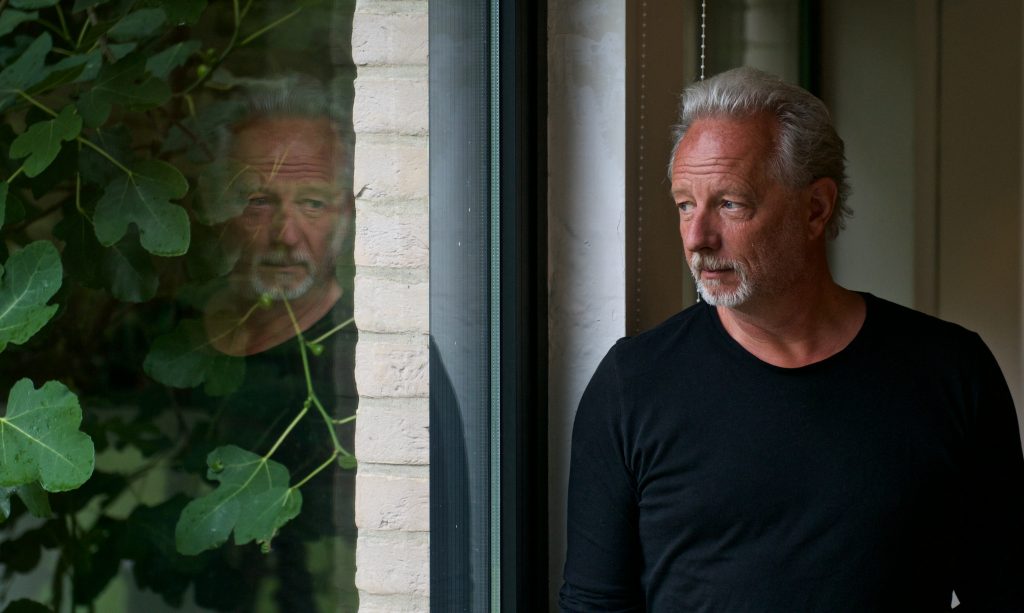
5. Wat durft u uw ouders niet te zeggen?
‘Er was in principe weinig wat ik mijn ouders niet durfde zeggen. Mijn vader was zijn hele leven beambte bij de administratie van de Belgische Spoorwegen, mijn moeder heeft haar hele leven aan haar gezin gewijd. Ze waren heel traditionele, katholieke mensen, maar wel ruimdenkend. Ook in de tijd dat ik wisselende verhoudingen had, waren ze altijd aardig tegen wie ik ook mee naar huis bracht. Ze gaven mij het gevoel dat ze me vertrouwden.
Als jongeman heb ik me losgemaakt van mijn katholieke achtergrond en me heftig tegen mijn ouders afgezet. De jonge linkse student die ik was, vond hen burgerlijk. Ik zette me af zoals een adolescent nu eenmaal doet: met grillige kledij, lange haren, rock-‘n-roll en wiet, en later door politiek links te gaan en hun katholieke levensvisie op de korrel te nemen. Sommige dingen had ik beter niet kunnen zeggen. In mijn eerste boek Ruimte staat een zin waar ik nog altijd spijt van heb: “Het milieu waaruit ik stam is een geestelijke vergeetput.” Ik heb hen daar bijzonder mee gekwetst. Mijn jongste zus heeft me dat meermaals voor de voeten gegooid, ze vond het egocentrisch van me. Ze had gelijk. In Oorlog en terpentijn heb ik dit beeld rechtgezet en beschreven hoeveel dit “milieu” me gegeven heeft. Hoewel ze zelden blijk heeft gegeven van gekwetstheid, zou ik mijn moedertje wel willen terugzien om te zeggen dat het me spijt. Zij is in 2002 overleden.
De laatste vijftien jaar van haar leven was de verstandhouding tussen mijn ouders en mij liefdevol en harmonieus. Alle plooien zijn gladgestreken. Daar heeft Sigrid een grote rol in gespeeld; zij spoorde me aan mijn ouders vaker te zien, hen gelukkig te maken. Pas als je ouder wordt en zelf kinderen hebt, besef je wat ze voor je hebben gedaan en ga je ze werkelijk waarderen. Ik heb het uitzonderlijke geluk dat ik vijfenzestig ben en dat mijn vader er nog is, Hij is nu vijfennegentig jaar. We zijn door alle stormen van het leven heen gekomen en weten: we kunnen het over bijna alles hebben. Maar het hóéft niet.’
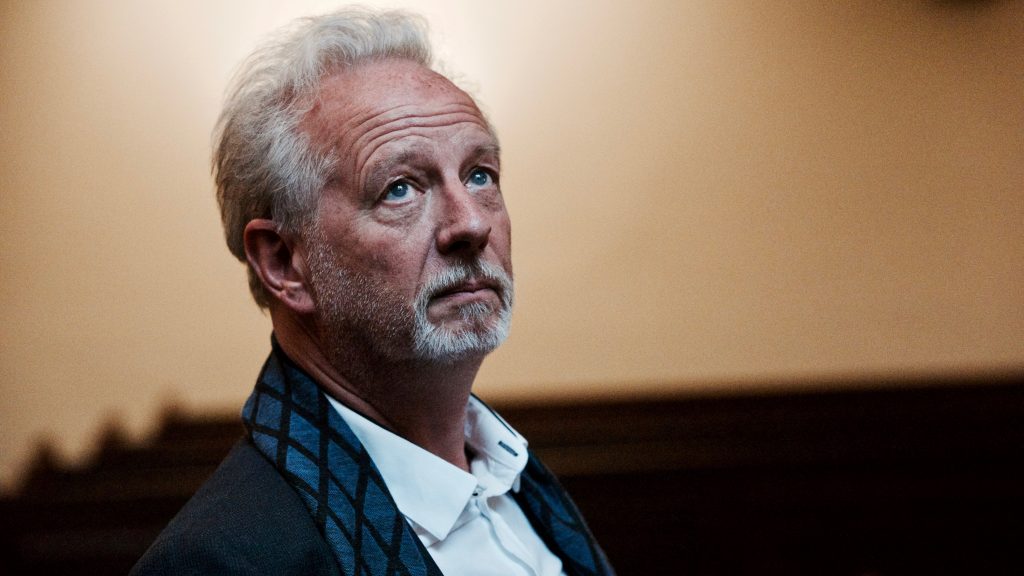
6. Wat is uw grootste pijn?
‘Ik vind ouder worden een pijn. Dat zat ik moeten leren aanvaarden. In mijn hart ben ik nog steeds dertig. Ik heb ook de illusie dat ik lijfelijk nog altijd dertig ben, maar dat valt tegen. Mijn lichaam verandert, ik ben stram als ik opsta. Na drie minuten is het over, maar vroeger had ik dat niet. Ik wil ook niet dat Sigrid ziet dat ik stram ben, dan voel ik mij vernederd. Wij schelen achttien jaar in leeftijd. Twintig jaar lang heeft dat geen enkele rol gespeeld. En nu voelen we alle twee dat het wél een rol begint te spelen. Terwijl ik op mijn vierenzestigste eigenlijk het leven heb van een man van zesenveertig: Sigrid zit in een carrièreswitch, we hebben een zoon van negentien, ik heb het na het winnen van de AKO Literatuurprijs heel druk gehad. Normaal is het rustiger op je vijfenzestigste.
Vroeger kon ik in de grootste onrust nog schrijven, maar de laatste tijd heb ik rust nodig, anders gaat het niet. Tegelijk had ik dat verlangen naar eenzaamheid altijd al. Het sociale aspect van het leven vind ik een grote opdracht. Ik ben heel sociaal, maar heb ook een stuk ondoordringbare eenzaamheid in mij. Als ik alleen ben, vind ik mijzelf terug. Schrijven komt voort uit mijn verlangen naar eenzaamheid, niet andersom. Wanneer ik een paar weken alleen in ons huis in Frankrijk ben, voel ik me euforisch gelukkig en komt er veel poëzie uit mij. Na drie weken wil ik weer naar huis. Ik ben eigenlijk een getrouwde celibatair.
Ouder worden jaagt me niet zozeer angst aan, als wel weerzin: ik wil dit niet.
Tot mijn zestigste vond ik het allemaal prima, maar nu heb ik het er moeilijk mee. Ik wil mijn energie behouden, ik wil kunnen blijven schrijven, voor Sigrid de man blijven die ik ben. Ze geeft me veel ruimte, ik kan naar Frankrijk gaan als ik daar behoefte aan heb. Ik zou daar graag meer tijd doorbrengen, maar tegelijk wil ik er zijn voor haar en onze zoon. Ik heb er altijd eer in gelegd dat ik de huisman was. De oma, die lekkere, voedzame maaltijden op tafel zette. Ook dat wil ik blijven.
De dood jaagt me wél angst aan. Ik leef veel te graag. Ik kan me gewoonweg niet voorstellen dat heel deze wereld ophoudt te bestaan in mij. Daar kan ik niet in berusten.’
De Vlaamse schrijver Stefan Hertmans (31 maart 1951) brak in Nederland door met de roman Oorlog en terpentijn (2013), waarvoor hij de AKO Literatuurprijs, de Gouden Uil Publieksprijs en de Vlaamse Cultuurprijs voor de Letteren kreeg toegekend. In 2016 schreef hij het poëziegeschenk voor de Poëzieweek. Afgelopen najaar verscheen zijn roman De bekeerlinge, over een elfde-eeuwse vluchtelinge.
Hertmans groeide op in Gent in een katholiek gezin. In 1981 debuteerde hij als schrijver met de roman Ruimte (1981). Sindsdien heeft hij een omvangrijk en veelzijdig literair oeuvre opgebouwd, dat bestaat uit poëzie, romans, theaterteksten, essays en korte verhalen. Bekende romans zijn onder meer Naar Merelbeke (1994), Als op de eerste dag (2001) en Het verborgen weefsel (2008). Hertmans publiceerde daarnaast in een groot aantal kranten en tijdschriften. Hij combineerde zijn schrijverschap tot 2010 met een baan als docent aan de Koninklijke Academie voor Schone Kunsten in Gent en gaf les en lezingen in onder meer Parijs, Londen, Wenen, Berlijn en Washington.
